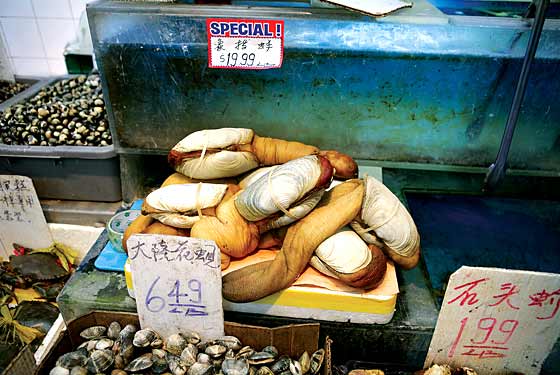
It’s all still there. The narrow lanes littered with red confetti the morning after Chinese New Year (this year, February 18 introduces the Year of the Boar). The scent of incense outside the Eastern States Buddhist Temple (the last building in the neighborhood with a wooden pagoda roof) mixing with aromas of noodles and duck fat from the restaurant across the street. The absurd number of barbershops on tiny Pell Street. The backrooms where private kung fu clubs train in traditional secrecy—if you’re white, black, Hispanic, or even an ABC (American-born Chinese), you’re not allowed. Despite the way the rest of the city has been slowly dulled by the conformity of global multinational corporations, Chinatown remains an oasis of the sort of whimsy, mystery, and grit that have always made New York great. And so we worried it was the beginning of the end a few years back when we heard that Moby was considering buying a multi-million-dollar penthouse on Essex and Canal. In truth, the signs of hipsterdom’s steadily encroaching assault on Chinatown had begun before that, with the arrival of Double Happiness, the Asian-themed basement bar on Mott Street. Having first moved to the neighborhood in 1990, I remember when coming home from work was truly like arriving in a foreign country: As the only non-Asian in a new luxury building on Elizabeth Street, not even my doorman spoke a word of English. It was great.
But the charms of being the lone soul in the neighborhood thrilled to walk over sidewalks awash in fish guts because at least there wasn’t a Starbucks in sight was offset by a sense of impending doom. As hipster havens continued to open their doors, I couldn’t help worrying that my private escape from the rest of New York would soon become another vanquished world. And to be sure, the list of cultural interlopers has grown, from the intentionally shabby 169 Bar, to the disturbingly chic Les Enfants Terribles. And there are more: Milk & Honey, Winnie’s, Good World, Swat Bar … the list keeps growing.
Or does it? A strange thing has happened in Chinatown’s seemingly inexorable submission to the hipster’s relentless need for Lebensraum. Instead of rolling over, Chinatown has actually expanded. First, it ate Little Italy. Lately, it seems to be expanding into Wall Street, Tribeca, and Soho. (Notice those signs popping up for TUI NA MASSAGE?)
Gentrification continues apace in the rest of the city, but it has been rebuffed here. Elsewhere in Manhattan, it seems everywhere you look there’s another luxury condo sprouting. In the early nineties, a similarly optimistic surge in new construction began to hit Chinatown, in anticipation of the wealthy businessmen who were expected to emigrate when Hong Kong returned to mainland China in 1997. A massive influx of immigrants did occur—Chinese arrivals increased by 53 percent in New York in the nineties, but they were largely from the mainland, and largely poor. Today, 49 percent of residents in the neighborhood earn less than $20,000 a year, and a third live in outright poverty. Only 5 percent of Chinatown residents earn more than $100,000 a year, as compared with 25 percent of people living in the rest of Manhattan. For most immigrants, a big paycheck is the first step toward moving out of Chinatown. So landlords are left renting rooms to migrant workers rather than upwardly mobile families, and those buildings have been absorbed into the noisy, gritty fabric of Chinatown’s aging tenements.
Chinatown has always had its own distinct economy, run by rules that make little sense to the rest of New York City. Many is the hipster who has wandered into Chinatown thinking that just because it’s easy to get dinner for $3.50, and an hour-long massage for $35, rents would be correspondingly cheap, only to find that no amount of money will get you a room in that adorable tenement on Pell Street.
In all my years here, I have never seen a homeless person or anyone begging for change. I was told that the triads simply won’t tolerate it. You’ll rarely get mugged, but the massive scale of heroin importing, human smuggling, prostitution, illegal gambling, and a brisk trade in counterfeit goods make Chinatown a crime epicenter, as well as one of the city’s safest neighborhoods.
So while, on the surface, Chinatown has always been a tourist magnet, behind the scenes the area has traditionally been, and in many ways remains, closed to outsiders. This xenophobia is part of the neighborhood’s appeal. To paraphrase Groucho Marx, nobody wants to join a club that will have you. And the reverse is true, even if it means stepping over a little bit of squid to get in.
FEBRUARY 18 is the first day of the Year of the Boar.
